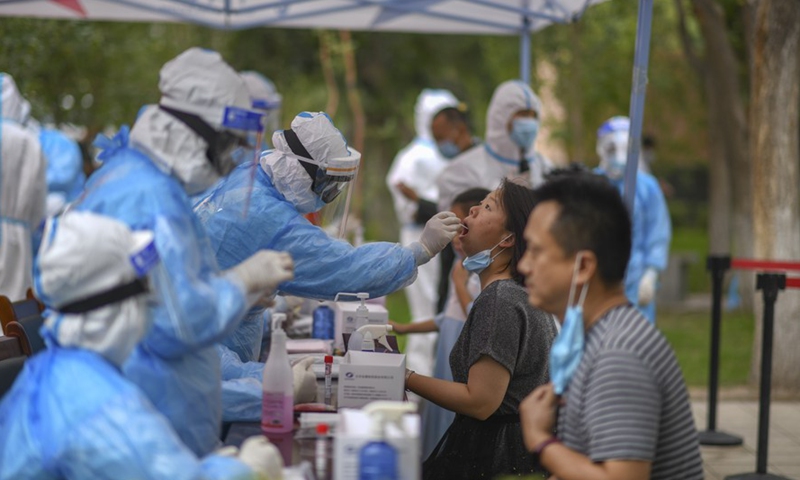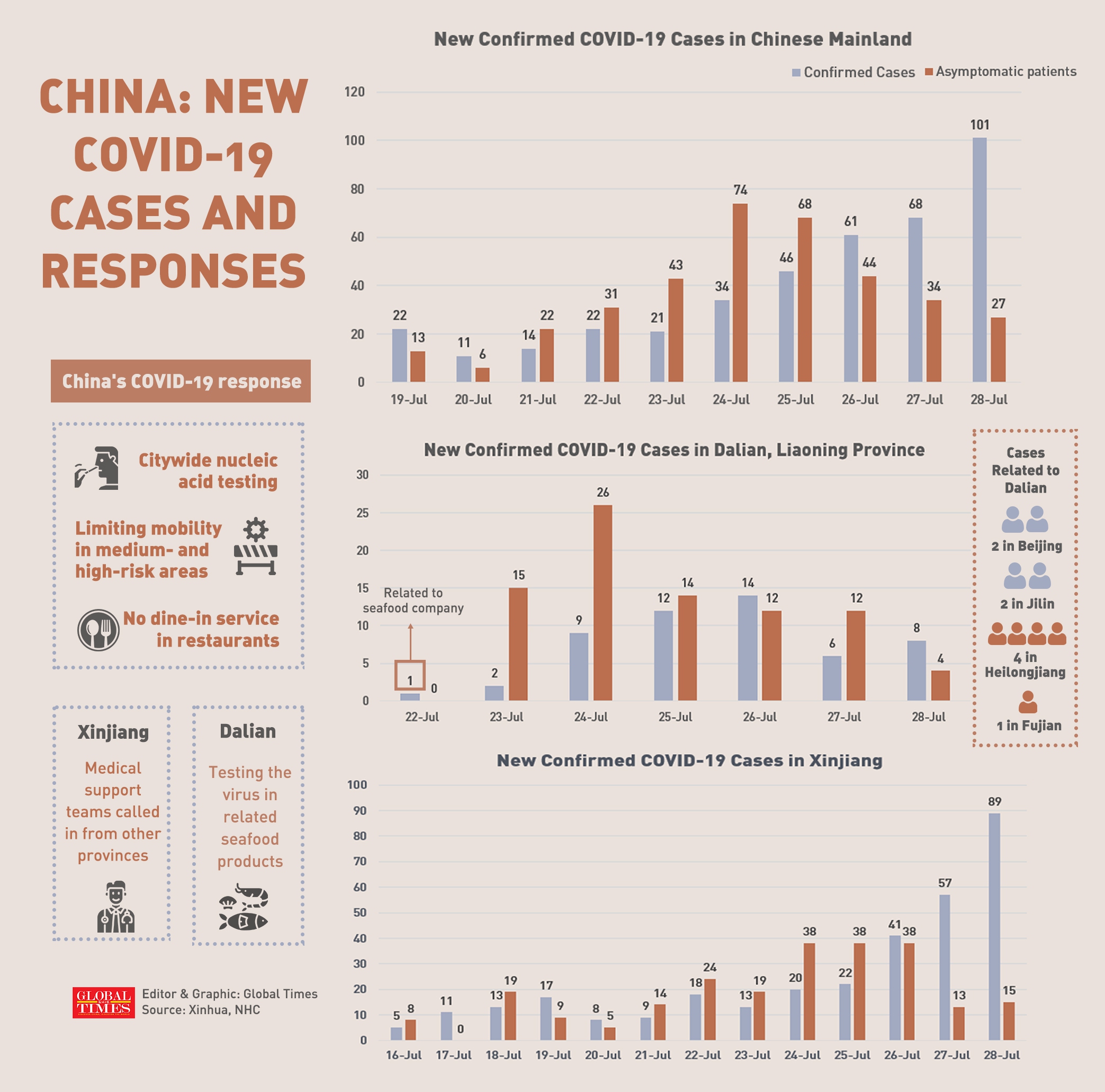Xinjiang leads daily COVID-19 caseload, but epidemic 'under control'
By Liu Caiyu Source: Global Times Published: 2020/7/29 20:28:41

Medical workers collect swab samples for residents at Tianshan District in Urumqi, northwest China's Xinjiang Uygur Autonomous Region, July 20, 2020. Urumqi is carrying out free nucleic acid tests for all residents and people who are visiting the city, in a bid to screen for novel coronavirus infections and reduce the risk of the epidemic spread.Photo:Xinhua
The Chinese mainland has seen a rise in newly confirmed COVID-19 infections for the fifth consecutive day, with the number jumping to 101 on Tuesday, with most found in Northwest China's Xinjiang Uygur Autonomous Region.
Tuesday was the first time that daily new cases in the mainland exceeded 100 since March 6. The increasing number of infections has sparked public concerns that a resurgence of the outbreak is on its way.
Residents and medical experts in Urumqi reached by the Global Times said on Wednesday that the outbreak in the city is controllable, as communities have been isolated, thanks to swift and effective anti-epidemic measures.
Of the new cases reported by the National Health Commission on Wednesday, 89 were reported in Xinjiang, eight in Northeast China's Liaoning Province, and one in Beijing, who was linked to the outbreak in Liaoning. There were also three imported cases.
All Xinjiang cases were detected in the region's capital city Urumqi. As of Tuesday, Xinjiang had 322 confirmed COVID-19 patients including 320 in Urumqi and 133 asymptomatic infections. A total of 9,121 are under medical observation.
A medical expert involved in the anti-epidemic medical team in Urumqi told the Global Times on condition of anonymity that the surge in new infections is the result of second-time nucleic acid tests in the city, which helped rule out false negative results.
Many patients in Urumqi gradually showed symptoms while under incubation, which also explains the surge of new confirmed infections, the expert noted.
After the first case was reported in early July, Urumqi had entered into a "wartime mode" against the virus, including sealing all local residential communities and banning gatherings.
To further curb the spread of the virus and dispel concerns of more potential asymptomatic cases, paper seals were stuck on some doors of residential compounds in Urumqi like some other cities that experienced an outbreak, the Global Times learned from locals and officials on Wednesday.
The paper seal is meant to discourage people from going out, but has no legal effect, the Global Times learnt from residents.
Officials at local communities and volunteers are helping to provide daily necessities to residents, a resident surnamed Wang in a community in Urumqi's Tianshan district, told the Global Times. "What we have to do every day is to reach volunteers through our phone, telling them what we need, and they will deliver to our door," Wang said.
Service for local residents is guaranteed. For example, Urumqi's Sayibak district has increased vegetable selling points to more than 500, with 74 community food stores, three farmers' markets and pharmacies open. Food supply is stable, the local government said.
More than 60,000 volunteers in the district were mobilized to help residents purchase daily necessities, get deliveries and provide anti-epidemic information.
Zhang Yuexin, a medical expert who is part of the Xinjiang anti-epidemic group and professor of the infectious disease department of the First Affiliated Hospital of Xinjiang Medical University, told the Global Times that the epidemic situation in Urumqi is developing toward a positive trend, believing Urumqi will end the epidemic within two months.
Urumqi reported its first case on July 15 in the new outbreak, with no deaths reported, and the first six patients have recovered and were discharged from hospitals on Tuesday.
Hospitals in Urumqi still have abundant medical resources since medical teams from other cities are contributing to their efforts. Most COVID-19 patients experience mild symptoms, but they've also been preparing for an unexpected new surge of COVID-19 patients with severe conditions, Zhang said. The Xinjiang Uyghur Autonomous Region sixth People's Hospital has prepared a tenth of in-patient beds for severely-ill patients, he said.
Asked whether Urumqi should build makeshift hospitals, Yang Zhanqiu, a deputy director of the pathogen biology department at Wuhan University, said makeshift hospitals are built to cope with a large-scale outbreak. The number of infections in Xinjiang has not yet reached the point where makeshift hospitals need to be built, Yang said.
In the wake of the unknown source of infections and the outbreak in Liaoning, food markets in Urumqi have tightened tightened food safety checks including imported beef, lamb and seafood. Some food markets reached by the Global Times said vendors are only allowed to sell imported food products if they obtain negative nucleic acid tests.
The gene sequencing of the virus in Xinjiang is similar to the viral strain of Beijing's recent outbreak. But the specific source of the clustered infections in Urumqi linked to a wedding remains unknown, Zhang said.

Graphic: GT
RELATED ARTICLES:
Posted in: SOCIETY,CHINA FOCUS